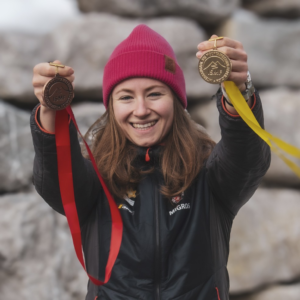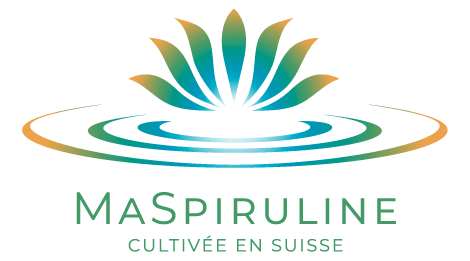Information
Marchés 2024
30.10 au 03.11.2024
Goût et Terroirs à Bulle
28.11 au 01.12.2024
Marché de Noël à Romont
14.12.2024
Marché de Noël à Vevey (Quartier de l’Oriental)
Marché de Noël à Cudrefin
20.12 au 22.12.2024
Happy Market à Genève
CAROLE PERROT, MASPIRULINE AMBASSADOR
Carole Perrot is a Swiss cross triathlete. She discovered this sport in 2014 and has been competing at a high level since 2019. She has numerous national and international victories on her record.
2021
X-Terra European Champion, Triple Swiss Champion (Cross/Olympic/Series), Jura Champion
2022
X-Terra World and European Champion, Triple Swiss Champion (Cross/Olympic/Series), Jura Champion
2023
Cross World Champion, Double European Champion (Cross/Aquabike), Swiss Champion (Cross)
2024
X-Terra World Champion, Triple European Champion (Cross/X-Terra/Sprint Distance), Double Swiss Champion (Cross/Duathlon), Jura Champion

I discovered triathlon in 2014 during a competition in Tramelan. Already practicing swimming, cycling, and running separately, I really enjoyed chaining them together. I was captivated by the idea and impressed by the complexity of combining these three disciplines into one sport.
My training is varied due to the three disciplines of triathlon. In winter, I go to the gym 2-3 times a week to work on strength and cardio, while swimming to improve technique and speed. Cycling allows me to do long endurance sessions. During the racing season, I focus on recovery. This enables me to approach competitions in top physical and mental shape. I also place great importance on mental and material preparation to ensure that upcoming races go as smoothly as possible.
When you demand a lot from your body, it is essential to nourish yourself in a natural and complete way to perform well and recover. Food is our essence, and understanding that it fuels our cells instills respect for our bodies. Eating healthily is a form of self-respect that does not contradict indulgence.
Spirulina, rich in nutrients, helps me maintain a ferritin level necessary for oxygen transport in the blood and proper muscle function. It is very complete, offering a good supply of protein, vitamins, and aiding in recovery thanks to its antioxidant content, which reduces oxidative stress caused by intense physical activity. It’s a magical supplement that supports me daily!
I mix spirulina flakes into my Budwig cream or add it to my daily salad.
From my experience, it’s wise to seek guidance and support from a skilled and experienced coach. To perform well, it’s essential to adapt training plans to one’s professional and personal life. Triathlon requires a wide range of techniques and training, and I believe that an individualized approach is best for progressing quickly according to specific needs.
MARIANNE FATTON, MASPIRULINE AMBASSADOR
Marianne Fatton is a Swiss alpine skier who aims to compete in the 2026 Winter Olympics in Italy. She has been practicing this sport at a high level for 10 years and holds numerous victories in her record. Her preferred discipline is the sprint.
2020
Winner of the World Cup in alpine skiing
2021
World Champion in sprint
2023
Vice World Champion in sprint
2024
European Champion in sprint 2024
Over 20 podium finishes in the World Cup at the elite level (currently I have 24).

I started competing in alpine skiing in 2014 in team races. Friends who were already practicing invited me to join their team. I accepted and loved it! Then I joined the CRO (Centre Régional Ouest), and in 2015, I became part of the Swiss team.
I started for the fun of it, accompanying my parents who were preparing for the Patrouille des Glaciers. In competitions, I quickly took the lead, and that motivated me to continue. This sport is a true passion: I love the glide, the mountains, and every outing is an adventure. I also appreciate the idea of making my body strong and capable of taking me anywhere. It’s more than just a sport; it’s a sport of the heart, a way of living and experiencing nature.
My coach organizes and plans all my training sessions. In summer, I focus on endurance (running, cycling) and strength. In autumn, I work on intensity with intervals and start skiing on the glacier. As competitions approach, I reduce my training hours to recover. In winter, between competitions, I do light sessions to maintain my fitness. After the season, I always take two weeks of complete rest.
Nutrition plays a crucial role in maintaining good health. For high-level athletes, being in good health is essential to perform at their best. I make sure to eat a balanced diet, but most importantly, I focus on consuming enough calories. When training a lot, you need a lot of energy!
Spirulina is very rich in protein, which is excellent for recovery after intense training sessions. Additionally, it is also rich in vitamins and minerals, such as iron, which helps the body respond positively when training at high altitudes.
Spirulina flakes are very convenient because they easily blend into all my dishes. I often add them to my salads, mix them into pesto for pasta, or sometimes sprinkle them on orange wedges. Its neutral taste allows it to be used with both savory and sweet dishes.
I first recommend trying it out with friends who are already involved in the sport. If no one in your circle participates, don’t hesitate to explore the “rando parks” offered at ski resorts. These are secure trails.
For young people who want to start competing, I advise them to join a regional center, like the CRO, and test themselves in regional races or the Swiss Cup.
